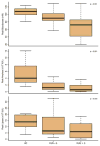Endoscopic pancreatic function test using combined secretin and cholecystokinin stimulation for the evaluation of chronic pancreatitis
- PMID: 22281107
- PMCID: PMC4474136
- DOI: 10.1016/j.gie.2011.11.011
Endoscopic pancreatic function test using combined secretin and cholecystokinin stimulation for the evaluation of chronic pancreatitis
Abstract
Background: Current endoscopic pancreatic function test (ePFT) methods use either secretin or cholecystokinin (CCK) to measure pancreatic function.
Objective: To evaluate a novel ePFT protocol that includes both secretin and CCK stimulation and to assess which fluid parameters best discriminate patients with chronic pancreatitis (CP).
Design: Prospective, cross-sectional diagnostic study.
Setting: Single, tertiary-care institution.
Patients: Healthy volunteers and patients evaluated for CP were included.
Interventions: All patients underwent a combined secretin-CCK ePFT. Patients evaluated for CP also underwent EUS during the same endoscopic session.
Main outcome measurements: Duodenal fluid bicarbonate, lipase, and amylase concentrations were measured after CCK and secretin stimulation. Results were compared based on the presence of CP detected by EUS (≥5 features).
Results: Twenty healthy volunteers and 69 patients evaluated for CP completed the secretin and CCK ePFT. Patients with an EUS score of 5 or higher had significantly decreased peak bicarbonate concentrations (72 mmol) compared with patients with an EUS score lower than 5 (90 mmol) and healthy subjects (108 mmol) (P < .001). Peak concentrations of amylase and lipase and total fluid volume were not significantly different between patients with CP and controls. Receiver-operating characteristic analysis revealed that peak bicarbonate concentration had superior discrimination for CP (area under the curve [AUC] 0.738) compared with peak amylase (AUC 0.677) and peak lipase (AUC 0.627). The addition of enzyme concentration measurement did not improve discrimination compared with peak bicarbonate alone.
Limitations: Secretin and cholecystokinin endoscopic pancreatic function test (SC ePFT) results were not compared with those of single hormone ePFTs.
Conclusions: The addition of CCK infusion and enzyme concentration measurement to a standard secretin ePFT does not enhance the diagnosis of CP.
Copyright © 2012 American Society for Gastrointestinal Endoscopy. Published by Mosby, Inc. All rights reserved.
Conflict of interest statement
Figures
References
-
- Conwell DL, Zuccaro G, Vargo JJ, et al. An endoscopic pancreatic function test with synthetic porcine secretin for the evaluation of chronic abdominal pain and suspected chronic pancreatitis. Gastrointest Endosc. 2003;57:37–40. - PubMed
-
- Stevens T, Conwell DL, Zuccaro G, et al. A randomized crossover study of secretin-stimulated endoscopic and Dreiling tube pancreatic function test methods in healthy subjects. Am J Gastroenterol. 2006;101:351–5. - PubMed
-
- Conwell DL, Zuccaro G, Vargo JJ, et al. An endoscopic pancreatic function test with cholecystokinin-octapeptide for the diagnosis of chronic pancreatitis. Clin Gastroenterol Hepatol. 2003;1:189–94. - PubMed
-
- Stevens T, Dumot JA, Zuccaro G, et al. Evaluation of duct-cell and acinar-cell function and endosonographic abnormalities in patients with suspected chronic pancreatitis. Clin Gastroenterol Hepatol. 2009;7:114–9. - PubMed
-
- Wiersema MJ, Hawes RH, Lehman GA, et al. Prospective evaluation of endoscopic ultrasonography and endoscopic retrograde cholangiopancreatography in patients with chronic abdominal pain of suspected pancreatic origin. Endoscopy. 1993;25:555–64. - PubMed
Publication types
MeSH terms
Substances
Grants and funding
LinkOut - more resources
Full Text Sources
Miscellaneous



